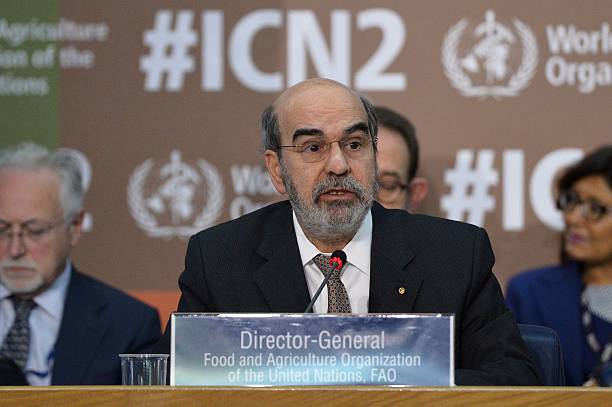 |
| The Food & Agricultural Organisation (FAO)’s Director-General José Graziano da Silva |
The Food & Agricultural Organisation (FAO)’s
Director-General José Graziano da Silva has advised African countries that even
though agriculture would continue to generate employment in Africa over the
coming decades, opportunities should be explored beyond agriculture throughout
the food chains in order to create enough jobs for young people, especially
those in rural areas.
This was revealed in press statement issued, signed and
made available to Food Farm News by
its National
Communication Officer, David Karls TSOKAR in Abuja.
Graziano da Silva reportedly made the remarks at FAO's Regional Conference for Africa which is primarily dedicated
to creating decent and attractive employment in the continent added that "countries
need to promote a rural and structural transformation that fosters synergies
between farm and non-farm activities and that reinforces the linkages between rural
areas and cities, This includes processing, packaging, transportation,
distribution, marketing and service provision, especially financial and business
services.
He pointed to FAO's regional programme saying "Youth Employment: enabling
decent agriculture and agri-business jobs", which goes beyond
farm jobs and seeks to develop capacity and scale up successful approaches
through programme formulation and partnerships and declared: "More than
ever, strategic partnerships are needed to bring together the African Union,
the African Development Bank and the UN system and other development
partners".
He warned however that more profitable urban markets can
lead to a concentration of food production in large commercial farms, and also
the creation of value chains dominated by large processors and retailers.
"In this contest, smallholders and family farmers
need specific policies and regulations. This includes providing access to
inputs, credit and technology and improving land tenure," Graziano da
Silva added, stressing how social protection programmes, including cash
transfers can link public food purchase to family farmer's production.
Estimates suggest that up to 12 million new jobs will
have to be created every year to absorb new labour market entrants over the
next 20 years. Today some 54 percent of Africa's working force relies on the
agricultural sector for livelihoods, income and employment, especially in
family farming.
With more people moving to cities, demand on urban food
markets will grow, which in turn can generate job opportunities in all
agriculture-related activities. But FAO believes that more must be done to
create non-agricultural employment in rural areas, including agro-tourism and
other services.
Also the FAO boss,
José Graziano da Silva has underscored
that in line with Sustainable Development Goal 2, achieving Zero
Hunger needs to go together with ending all forms of malnutrition, a
consequence of which is the current global overweight and obesity epidemic
saying obesity related disease may become the biggest killer in Africa by 2030.
Rapid urbanization and consumption of highly processed
foods are the major drivers behind the increase in overweight and obesity. Yet
many people in Africa are unaware that certain foods are unhealthy, or that
being overweight presents a health risk, the FAO Director-General said.
He urged for the need to "act on two fronts"
focusing on both the production and consumption of healthy food, and called for
ensuring more responsible advertising and information campaigns on food products.
"People must be aware about the pros and cons of what they are eating, and
also be encouraged to eat healthy food."










No comments:
Post a Comment